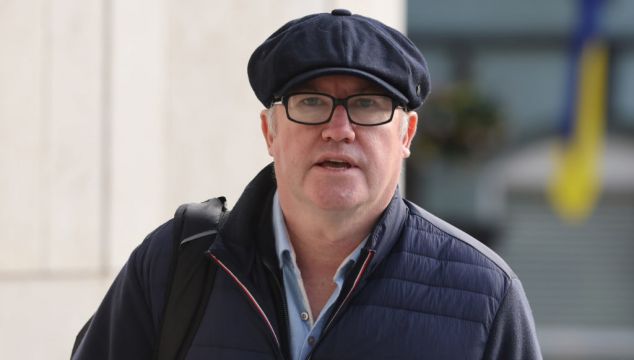An ACC Bank official has told the multiple million-euro theft trial of Michael Lynn that the bank was not aware that the former solicitor had obtained loans from other financial institutions to buy a property in Howth.
Mr Lynn (55), of Millbrook Court, Redcross, Co Wicklow is on trial at Dublin Circuit Criminal Court accused of the theft of around €27 million from seven financial institutions. He has pleaded not guilty to 21 counts of theft in Dublin between October 23rd 2006 and April 20th 2007.
It is the prosecution’s case that Mr Lynn obtained multiple mortgages on the same properties, in a situation where banks were unaware that other institutions were also providing finance.
The financial institutions involved are Bank of Ireland, National Irish Bank, Irish Life and Permanent, Ulster Bank, ACC Bank, Bank of Scotland Ireland, and Irish Nationwide Building Society (INBS).
William Nelson, fraud officer for ACC Bank, confirmed on Wednesday the bank is no longer trading as a separate legal entity to its parent company, Rabobank.
He agreed with John Berry BL, prosecuting, that Mr Lynn was a customer of the bank's Ballina branch in 2004 and later approached the institution for finance to buy Glenlion House in Howth in September 2006.
Documents
Mr Nelson was taken through a mixture of documents including loan offers and internal memos.
He agreed that an application was made in the names of Mr Lynn and his wife Brid Murphy for a loan of €3.78 million, being 70 per cent of Glenlion's €5.4 million valuation.
He said the loan's purpose was to purchase a private dwelling home, and it was not a commercial loan from the bank's perspective.
Mr Nelson told the court that the bank instructed its own external solicitors, Douglas Kelly and Co, to act on its behalf in this transaction.
The loan was drawn down on April 12th 2007 and payments were made until October 2007.
He agreed with Mr Berry that the bank had a first legal charge over the property which later allowed it to realise its security. Glenlion was repossessed, later sold and the loan recovered.
Loans
Mr Nelson said the bank was not aware that INBS and Bank of Scotland Ireland had also provided loans of €4.12 million and €3.85 million respectively to Mr Lynn for the purchase of Glenlion in April 2007.
He agreed that ACC would not have lent to Mr Lynn if they had been aware of these other loan facilities.
Mr Nelson told Paul Comiskey O'Keeffe BL, defending, that his employment with ACC started in 2010 and the bank's records were compiled for gardaí by another bank employee in 2009.
He agreed that he did not have direct knowledge of the bank's lending to Mr Lynn in 2007 as he was not working there at the time.
Mr Comiskey O'Keeffe put it to Mr Nelson that a letter accompanying a financial questionnaire seemed to suggest that Mr Lynn sign and return the blank document.
“I've never seen that before. I can’t see a scenario where it would be approved,” he replied.
Mr Nelson said he did not agree when defence counsel suggested the only “logical interpretation” of the letter was a request to sign a blank form which would be completed later by a bank official.
He agreed that Mr Lynn had other lending with ACC at the time of the Glenlion application and a condition was imposed that this lending should be repaid.
Mr Nelson said the bank would not want to be over-exposed to a client, and as “the bank was aware Mr Lynn was involved in property development, they would keep an eye to ensure that the overall exposure remains within the appetite of the bank”.
He said he could not agree that the bank accepted an unsigned statement of affairs, describing it as “unusual”.
Mr Comiskey O'Keeffe showed Mr Nelson an unsigned letter of offer, which the witness noted could be a “draft” document. He said he couldn't say if the loan offer was never signed or if there was another version of the loan.
Mr Nelson agreed it was “not impossible” that there could be further documents which may have been moved to external solicitors during legal proceedings.
Financial regulator
He said he was not aware of the bank withholding documents on the basis of legal privilege or of an enquiry by the financial regulator into lending by institutions to Mr Lynn.
Defence counsel then took the witness through an internal credit memo relating to the Glenlion application and its references to the long-term development potential of the house and site. He suggested that his client had advised the bank of his intention to develop the site.
Mr Nelson replied that the notes could be interpreted as the ACC relationship manager outlining conversations with Mr Lynn including about his intention to develop the site.
He added: “that's what is written there. That’s not what the loan was given for. You can say in the application that it might be suitable in the future for development, but that’s not what the loan was granted for.”
Mr Comiskey O'Keeffe put it to Mr Nelson that this document records a conversation between Mr Lynn and the relationship manager. “You can infer a conversation happened, but I can’t say for sure.”
Defence counsel suggested that the credit committee minutes, noted in the memo, suggest they had an “eye on the future development” of the site.
Mr Nelson replied that it suggests the committee is “aware it is a possibility at some point in the future”.
The witness also told the jury he did not carry out any investigation into this loan and was not aware of an internal enquiry by ACC.
Earlier on Wednesday, John Kinsella of accountancy firm Kinsella Mitchell & Associates agreed with Mr Berry that the last genuine statement from the office was dated July 11th 2006.
The court has heard that Mr Kinsella was partner in the firm which acted as independent auditors for Mr Lynn's property development company – Kendar Holdings Limited - and as accountants for his legal practise, Michael Lynn & Co solicitors.
Mr Kinsella agreed that there are legal distinctions between a person and a company. He agreed his answers during cross-examination about Kendar Holdings Ltd relate to that company.
He confirmed to Mr Berry that his recollection is that Mr Lynn was “heavily involved” in property development.
He further agreed when Mr Berry put it to him that the seven banks in this case are not a “monolithic entity” and while they have some similar procedures, it was “impossible to generalise them all in the same way, as it's impossible to say the Irish or the French”.
Mr Kinsella accepted that the firm would have no liability when anyone applies the firm's stamp and signature without their knowledge to a document. He also told the jury that statements of affairs are not statutory documents.
The trial continues before Judge Martin Nolan and the jury.







